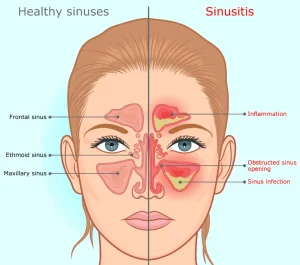Overview
Diagnosis
To diagnose chronic sinusitis, your healthcare provider will ask about your symptoms and perform a physical exam. The exam may include gently pressing on your nose and face to check for tenderness and using a lighted tool to look inside your nose.
Additional tests that help confirm chronic sinusitis or rule out other causes include:
• Nasal endoscopy – A thin, flexible tube called an endoscope is inserted into the nose. The light and camera on the tube allow your healthcare provider to examine the nasal passages and sinus openings.
• Imaging tests – CT or MRI scans can show detailed images of the sinuses, helping pinpoint blockages, infections, or structural issues.
• Nasal and sinus samples – Although not commonly used, tissue samples may be collected if the condition does not improve with treatment or worsens. This can help identify infections or other underlying causes.
• Allergy testing – If allergies are suspected, an allergy skin test can help identify potential triggers that may be contributing to chronic sinusitis.
Treatment
Treatment for chronic sinusitis focuses on reducing inflammation, keeping the nasal passages clear, and addressing the underlying cause.
Medications and other therapies
• Nasal corticosteroids – Sprays such as fluticasone, budesonide, mometasone, or beclomethasone help reduce swelling and prevent sinus flare-ups. Some are available without a prescription.
• Saline nasal rinses – Using a squeeze bottle or neti pot can flush out mucus and allergens, keeping the sinuses clear. Saline sprays are also an option for gentle daily use.
• Corticosteroid shots or pills – These are prescribed for severe inflammation, especially in people with nasal polyps. Because of possible side effects, they are used only for short-term relief.
• Allergy medicines – Antihistamines or other allergy medications can help if sinusitis symptoms are linked to allergic reactions.
• Aspirin desensitization therapy – For people sensitive to aspirin who also have nasal polyps, supervised aspirin desensitization can gradually build tolerance and reduce sinus inflammation.
• Biologic therapies – In cases of chronic sinusitis with nasal polyps, injectable medicines such as dupilumab, omalizumab, or mepolizumab can help shrink polyps and relieve congestion.
Antibiotics
If a bacterial infection is suspected, your healthcare provider may prescribe antibiotics. Treatment duration depends on the severity and persistence of symptoms.
Immunotherapy
When chronic sinusitis is linked to allergies, allergy shots (immunotherapy) may help reduce sensitivity to specific allergens and prevent flare-ups.
Surgery
For cases that do not improve with medicines or other treatments, endoscopic sinus surgery may be recommended. In this minimally invasive procedure, a healthcare provider uses a thin, flexible endoscope with tiny surgical tools to remove tissue or polyps blocking the sinuses. Surgery can improve airflow, drainage, and overall sinus health.
Advertisement

